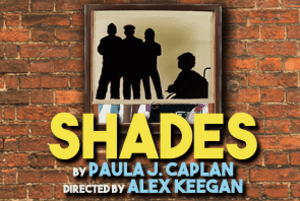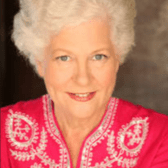Shades and Stories: An Interview with Paula J. Caplan
The people who make stories a central focus of their life come in all genders, colors, creeds, and professions. JWA was lucky enough to speak with Paula J. Caplan, who first championed women’s stories as a clinical and research psychologist,and has now turned her attention, as a playwright, to the struggles that returning veterans face. Her newest play, Shades, is at the Cherry Lane Theatre in New York until December 17th.
Q: Veterans have been a central focus in your creative work. What is it about veterans and their stories that resonates with you?
A: About 93% of Americans – those who have not served – have little idea what people experience in the military and at war, and that is unhealthy for veterans and for the whole nation, because they serve in the names of all of us, whether or not we want them to… Veterans are trained to confront matters of life and death head-on in ways that few of us ever do, and that often teaches them about themselves and about humankind in ways that the rest of us rarely learn…often causing deep torment in those who have served. War trauma and military rape are often readily diagnosed as signs of mental illness, when in fact they are deeply human responses to trauma. Often, veterans are isolated from the rest of their communities, with sometimes disastrous and nearly always painful consequences.
Q:Your newest play, Shades, was originally written in 2000, before 9/11, Afghanistan, and the Iraq war led to another generation of veterans who bear the visible and invisible effects of war. What prompted you to write this story in 2000? In the sixteen years since its inception, how has Shades and the story you wanted to tell evolved over time?
A:When I wrote the first version of SHADES – and it has changed in important ways since then, including a whole new, crucial scene I just wrote in August – I thought I was writing a history play. The first-ever reading of the play was in early September, 2011, in a new plays festival, and was slated to have two more readings in that festival. Then 9/11 happened, and the other readings were canceled. When, some days later, I went back to the script to work on it, chills went up my spine as I realized, “This is about what is happening now!” This is still the case today with new waves of veterans coming home and debates raging on about what it means to be a good American and whether one can be a good American if you don’t like what your government is doing.
Q: The visiting daughter, Val, is the only non-veteran in the play and she is often on the outside looking in when it comes to understanding and empathizing with the other characters. As a woman, and as a relative outsider to the veteran experience, what were some of the key issues she must process in Shades?
A: Val confronts the paucity of her knowledge about veterans’ experiences, despite having been raised by a father who was a veteran, having a brother who fought in Vietnam, and having been married to a Vietnam veteran. She comes up against the centuries-old dilemma women have faced about what to do when the men one loves are suffering but do not open up about what they need and are reluctant to accept help from women. Val is torn apart, wondering whether the approach traditionally considered feminine (being open and expressive) is the “right” one to use or whether to become “not-me” by being as reserved as she possibly can when the men in her life are claiming that silence is the best thing for them.
Q: In your professional life, your work also emphasizes the importance of listening, and listening well. In Bias in Psychiatric Diagnosis you assert that women’s behavior is more likely to be pathologized than men’s. Why do you think this pathologizing occurs? Have you noticed any significant shifts since your book’s publication in 2004?
A: This pathologizing occurs for the same reason that any relatively powerless or oppressed or scapegoated group is more likely to be pathologized than that of white, heterosexual, middle-class or wealthy men. In any society, those who hold the most power need to have scapegoats whom they can blame when they themselves are criticized or otherwise challenged. Otherwise, they risk losing their power.
Thus, they must deal with the danger that the less powerful will do things that are admirable, which makes them harder to scapegoat. So those in power develop ways to take whatever the scapegoated people do that is good and transform it into “evidence” that they in fact are bad, deficient, immoral, not credible, and so on. Calling them mentally ill is an easy and devastating way to achieve this, and it is done not only to women but also to anyone who is not part of that most powerful group. There is solid research proving this.
Sadly, I have seen no significant diminution in that practice since 2004. In fact, some of the gains women have made since then are so threatening to the powers-that-be that it intensifies the latter’s need to pathologize women. Whatever one feels about the politics of Hillary Rodham Clinton, the intense sexism directed at her during her political campaigns – sexism that has been both shockingly explicit and disturbingly veiled – is evidence of this pattern.
Q: Your research, creative writing, and advocacy all exist at a beautiful intersection of psychology and playwriting. Both of these fields have been shaped by Jewish women. Are there any Jewish women playwrights whose work inspires and motivates you?
For Jewish playwrights, it is Lillian Hellmann, Eve Ensler, Patricia Lee Stotter, Wendy Wasserstein, and Gertrude Stein. These women create deeply human characters one cares about, and I love their explicit or implicit feminist sensibilities and their gifts for dramatizing in different ways important social and political matters.









Hellow my name is MartinRom. Wery capable post! Thx :)